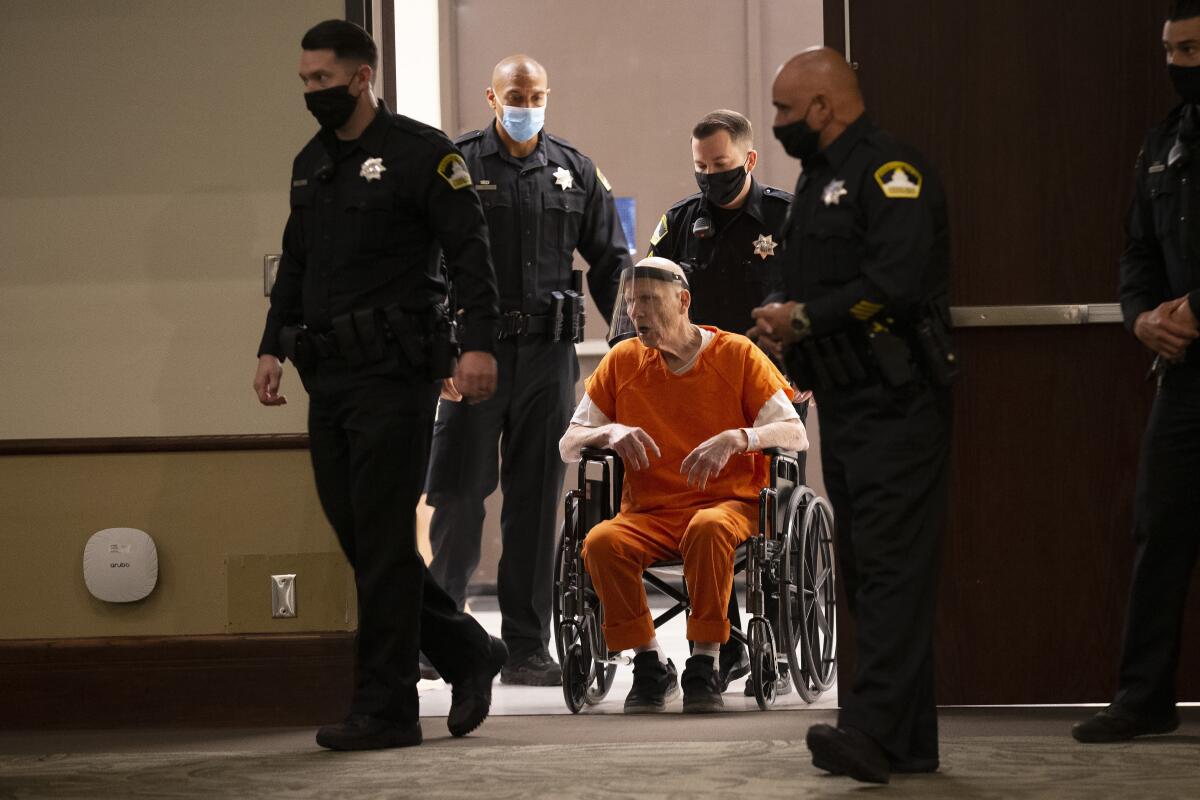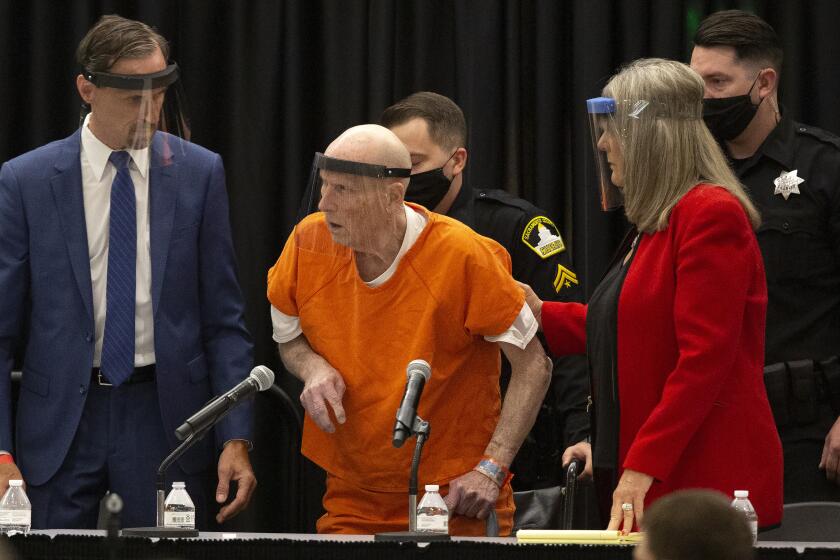In California, the death penalty is all but meaningless. A life sentence for the Golden State Killer was the right move

SACRAMENTO — The Golden State Killer is the perfect example of why the death penalty is justified — and why life in prison is preferable.
Especially in California, where a death penalty sentence is practically meaningless.
Joseph James DeAngelo Jr. — also dubbed the Visalia Ransacker, East Area Rapist or Original Night Stalker, depending on the community he terrorized — was among “the worst of the worst.”
“He is the real-life version of Hannibal Lecter,” Sacramento County Dist. Atty. Anne Marie Schubert told reporters, referring to the fictitious psychopathic killer in the movie “Silence of the Lambs.”
Schubert spoke Monday after DeAngelo pleaded guilty to 13 murders and 13 charges of kidnapping for purposes of robbery during 13 years of horror up and down California.
DeAngelo also admitted to 161 uncharged crimes of rape, attempted murder, robbery, burglary and kidnapping involving 61 victims. There were 42 uncharged rapes. These crimes weren’t prosecuted because the statutes of limitations had long ago expired.
He was “a cruel, intelligent, sadistic serial killer,” Schubert said. “He is a sociopath. He is a master manipulator.”
During the 1970s and 1980s, DeAngelo would break into couples’ homes at night while they were asleep, force the woman to tie up her husband or boyfriend with shoestrings, then bind the woman. He’d place saucers and cups on the man’s back as an alarm system and warn that if he heard them rattle, everyone in the house would be killed.
He’d drag the woman into another room and rape her repeatedly, sometimes witnessed by her children. He threatened to cut the ears off one little girl if she screamed. Meanwhile, he ransacked the house and helped himself to refrigerator snacks.
In the end, DeAngelo would kill the couple anyway by shooting or bludgeoning them — with a pipe wrench or a sprinkler head or a fireplace log.
“What’s so frustrating,” Orange County Dist. Atty. Todd Spitzer told me, referring to the prosecutors’ and defendant’s agreed-upon sentence of life imprisonment without possibility of parole, “is that if anyone is the poster child for the death penalty, it’s DeAngelo.”
Opponents of capital punishment argue that it’s administered unfairly and sometimes against people who may be innocent. They also point out that people of color, the poor and those with mental illness are disproportionately executed.
But none of that applies to DeAngelo. There’s no question of his guilt, not just because he confessed, but because DNA linked him to the crimes unequivocally. Moreover, he’s white, middle class and college educated — a former policeman fired for shoplifting. DeAngelo had plenty of opportunity.
His life was spared not out of mercy, but because of practicalities.
Prosecutors from six counties decided unanimously not to seek the death penalty for several sound reasons.
Most importantly, they traded an unlikely future execution for DeAngelo’s agreement to admit committing not only the charged murders and kidnappings, but all the rapes and other crimes that legally couldn’t be prosecuted.
That was important for the rape survivors and victims’ families. They’ll have an opportunity to speak directly to DeAngelo when he is formally sentenced on Aug. 17.
“I was going back and forth all day,” Spitzer says of Monday’s court proceedings in a Cal State Sacramento ballroom, where prosecutors read aloud the horrific details of each crime. “Did I make the right decision?
“The only reason I agreed was I spoke to all the family members of the four Orange County murder victims and they agreed this was the best thing.”
If prosecutors had not agreed to life imprisonment, Spitzer says, DeAngelo “never would have admitted to the crimes. The admissions were significant.”
That raises another point often argued by supporters of capital punishment: The possibility of the death penalty is needed as leverage to persuade killers not only to plead guilty, but to confess to other unsolved murders they committed and disclose where bodies were left.
Victims watch as a former police officer admits to committing murders and rapes in the 1970s and 1980s.
There’s another reason for not seeking the death penalty for DeAngelo. At 74 and appearing frail — although some prosecutors believe he’s faking frailty — it’s very doubtful he would have lived long enough to be executed.
“It would have taken 10 years to go to trial and the trial would have lasted two years,” Spitzer says. “Then there’d be 20 to 25 years of appeals. ...
“Most of the surviving adult victims would probably not be with us anymore. And we were losing witnesses. They were dying.”
All those years of legal proceedings would have cost taxpayers many wasted millions and court systems’ precious energy and time.
Better to quickly send DeAngelo into the general prison population, where most inmates have cellmates and must work for pennies.
Death row in California can be a relative resort with single cells, personal TVs, generous access to the exercise yard and free legal services.
Of course, California doesn’t really have a death penalty. Gov. Gavin Newsom — breaking his campaign promise to enforce capital punishment — declared a moratorium on it shortly after taking office.
That’s despite California voters twice in recent years rejecting efforts to repeal the death penalty. They even voted to expedite it.
The state has executed only 13 murderers since 1978, the last in 2006. Meanwhile, there are 725 killers on death row. Their principal cause of death is old age.
Newsom should summon the courage to ask voters to officially repeal the death penalty and save taxpayers future billions for the special treatment of condemned murderers.
Thankfully, DeAngelo’s prosecutors made the wise decision to save many millions of tax dollars and years of time — and obtained 187 confessions.
Regardless of the life or death sentence, the depraved DeAngelo will die behind bars.
More to Read
Sign up for Essential California
The most important California stories and recommendations in your inbox every morning.
You may occasionally receive promotional content from the Los Angeles Times.












